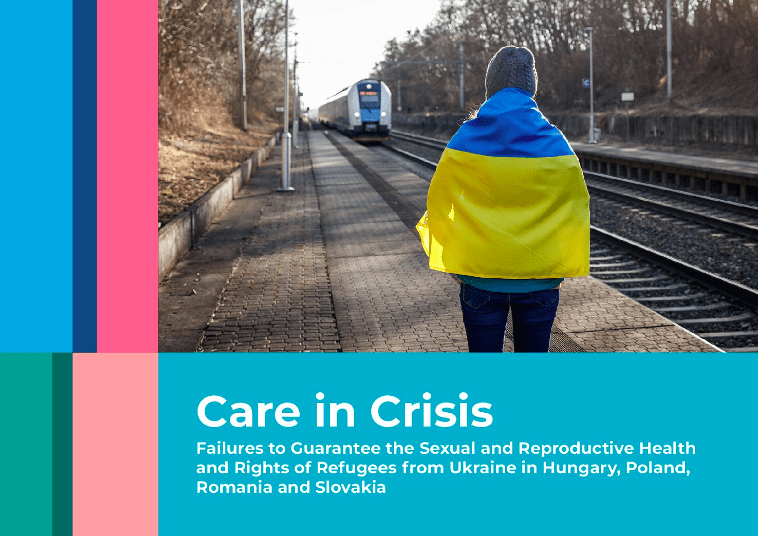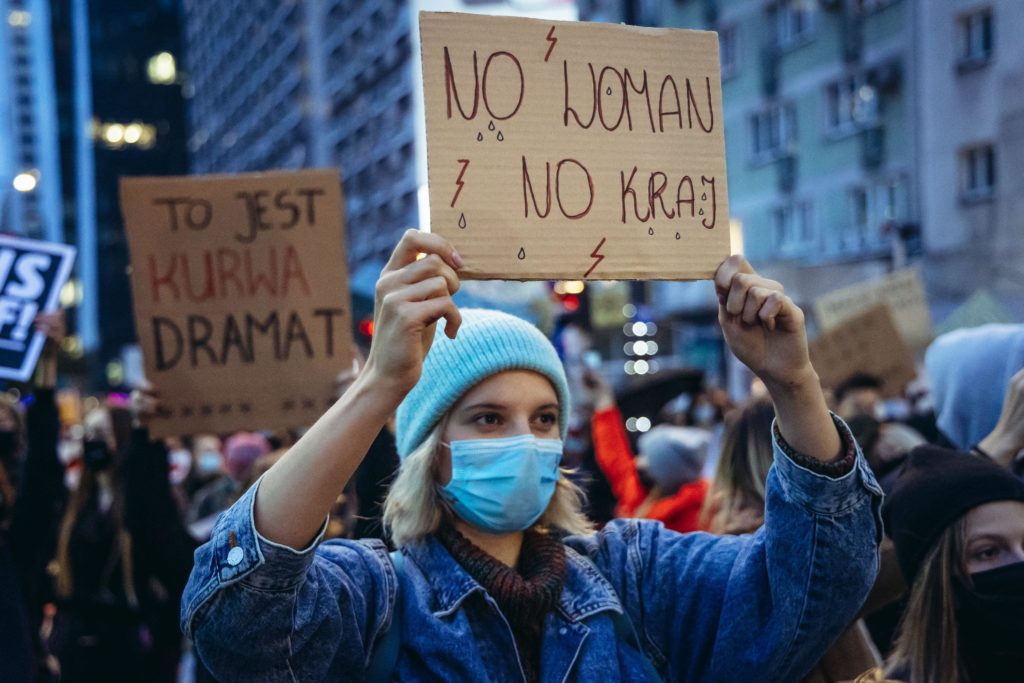New Study Finds Many Refugees from Ukraine are Cut Off from Reproductive Health Care
Facing restrictive abortion and contraception laws and other quality of care barriers in Hungary, Poland, Romania and Slovakia, many women feel they have no choice but to return to Ukraine to obtain care.

Women who have fled the invasion of Ukraine are at times facing yet another crisis in Hungary, Poland, Romania and Slovakia: severe barriers in accessing reproductive health care and support services for gender-based violence.
The finding is from a new multi-country fact-finding report released today by a collective of nine national and international human rights organizations, including the Center for Reproductive Rights. Titled Care in Crisis: Failures to guarantee the sexual and reproductive health and rights of refugees from Ukraine in Hungary, Poland, Romania and Slovakia, the report documents the multiple barriers women and other refugees experience when trying to access good quality sexual and reproductive health care in these four countries.
Read the complete report here.
It also makes detailed recommendations to the governments of each country, the European Union, and humanitarian actors and donors on policies and practices to reduce barriers and improve access.
The study is part of the Center’s joint initiative with national partners to address barriers being faced by women and girls impacted by the war in Ukraine when trying to access contraception, abortion care and maternal healthcare in other European countries.
According to the report, such barriers—which include legal restrictions, cost barriers, information shortfalls, poor quality care and lack of basic services—have forced some women to return to Ukraine just to obtain care. In addition, many refugees must seek care outside of legal pathways or go without care entirely.
“The European Union has promised to provide refugees from Ukraine with sanctuary and care. Yet women from Ukraine who are now in Hungary, Poland, Romania and Slovakia often experience a very different reality when they need sexual and reproductive healthcare. Instead of care and protection, they regularly face an obstacle course of restrictions, confusion, stigma and discrimination,” said Leah Hoctor, Senior Regional Director for Europe for the Center for Reproductive Rights. “The health and wellbeing of some refugees from Ukraine is being placed at risk because of failures to guarantee access to essential and time-sensitive healthcare and support services, compounding the harm they have endured as a result of the invasion of Ukraine.”
The report calls on leaders of the concerned governments, the European Union, the United Nations, donors, and the broader international community to urgently implement measures to protect the sexual and reproductive health and rights of refugees.
Refugees Face Restrictive Reproductive Health Laws and Policies
The invasion of Ukraine by the Russian Federation in February 2022 has brought devastating consequences for the people of Ukraine, including widespread human rights violations, gender-based crimes and conflict-related sexual violence—in addition to military attacks on civilian infrastructure and the destruction of many hospitals and health facilities.
The invasion has forced millions of people—mostly women and children—to seek refuge in countries throughout Europe, with many seeking refuge in Hungary, Poland, Romania and Slovakia.
In those host countries, women encounter some of the most restrictive legal and political contexts for SRHR in Europe. Highly restrictive laws on abortion and emergency contraception, cost barriers, weak protection and response structures for gender-based violence—including the lack of appropriate referral pathways, psychosocial support services and clinical management of rape—are just some examples of the longstanding barriers that are now confronting refugees.
Legal and policy barriers include:
The Center’s Ukraine Initiative
More than 90% of the millions of refugees fleeing the war in Ukraine are women and children—many with needs to access sexual and reproductive health care.
The Center and its national partners started a joint initiative in March 2022 to identify and address barriers faced by these refugees in trying to obtain abortion care, emergency contraception, and maternal health services in Hungary, Poland, Slovakia and Romania. The initiative will also examine challenges facing organizations providing support and assistance to refugees.
Findings and recommendations from this joint project will be shared with governments, international bodies, and humanitarian actors to inform their programming and response plans.
- In Poland, abortion is prohibited in almost all circumstances. Abortion is legal only following sexual assault or where a pregnant woman’s health or life is at risk. In practice, it is extremely difficult to access abortion even in these exceptional situations.
- Although abortion is legal in Hungary and Slovakia, a range of procedural requirements constrain access. In both countries, abortion is legal on request until 12 weeks of pregnancy and after that on exceptional grounds.
- Hungary and Poland are the only two countries in the European Union that do not allow emergency contraception to be sold in pharmacies without a prescription.
- In Hungary, Poland and Slovakia, laws do not allow adolescents under 18 years of age to access healthcare, including sexual and reproductive healthcare, without the consent of a parent or guardian.
Report Based on Interviews with Refugees and Stakeholders
Care in Crisis: Failures to guarantee the sexual and reproductive health and rights of refugees from Ukraine in Hungary, Poland, Romania and Slovakia is based on more than 80 interviews with refugees, professional stakeholders, and experts in Hungary, Poland, Romania and Slovakia conducted between July 2022 and April 2023.
The report was undertaken by a collective of nine women’s rights, human rights, sexual and reproductive health and rights and gender-based violence organizations working in Hungary, Romania, Poland Slovakia, the European region and internationally. They include: the Center for Reproductive Rights (International); EMMA Association (Hungary); E-ROMNJA (Romania); FEDERA (Poland); FEMINOTEKA (Poland); Freedom of Choice (Slovakia); FILIA (Romania); ALEG; and Independent Midwives Association (Romania).
Key findings of the report are:
- Many refugees feel that they have no choice but to return to Ukraine temporarily if they need sexual and reproductive healthcare.
- Because of numerous barriers to care, many postpone seeking sexual and reproductive healthcare for as long as possible—delays that can put their health at risk.
- In Poland, because of the country’s abortion ban, many refugees are forced to seek abortion care outside of legal pathways by obtaining abortion medication through online services run by NGOs in other parts of Europe.
- Survivors of gender-based violence often go without basic services and support so must deal with trauma, health concerns and other consequences on their own.
- Certain groups of refugees—particularly Roma women and LGBTQ+ refugees—face intersectional discrimination and increased barriers.
- When care is obtained, it is often only due to assistance from NGOs and human rights defenders.
Report Makes Several Recommendations to Reduce Barriers and Improve Access to Services
The Center’s Work in Humanitarian Settings
In humanitarian and transitional justice settings, the Center works to guarantee sexual and reproductive health and rights (SRHR) and to hold governments accountable for their human rights obligations.
The report outlines in detail recommendations on policies and practices to the governments of Hungary, Poland, Slovakia and Romania, as well as to the European Union and humanitarian actors and donors. Among the many recommendations are calls for stakeholders to:
- Improve availability and dissemination of information about services, including translations in multiple languages.
- Support the organization of training seminars for healthcare workers and other key actors.
- Remove cost barriers by ensuring refugees have access to national health insurance.
- Ensure long-term, sustainable funding for programs.
- Incentivize healthcare professionals to treat refugees and register them as patients.
- Ensure abortion on request is legalized and provisions criminalizing the provision of abortion care are repealed.
- Establish effective procedures to ensure adolescents travelling alone can access sexual and reproductive health care without consent of a parent or guardian.
- Ensure effective and legal procedures of rape crisis centers.
- Elaborate and disseminate clinical practice guidelines for sexual and reproductive healthcare, including on maternal healthcare during childbirth and neonatal care, in accordance with WHO guidelines.
- Make medical (medication) abortion available including via telemedicine.
Read the complete findings and recommendations in the report:



